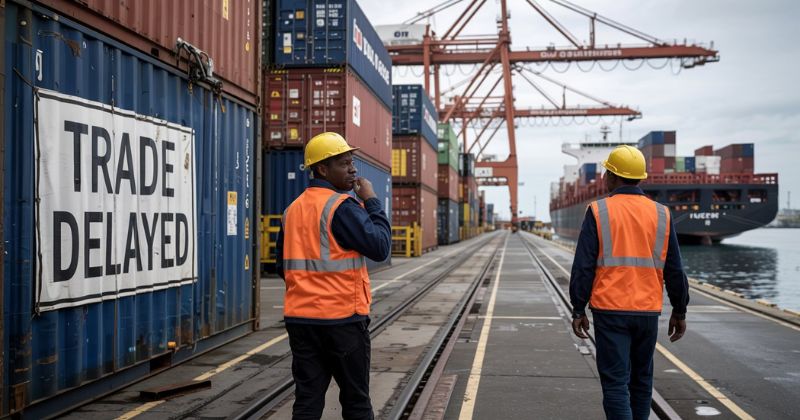
Several economists have raised serious doubts about the South African government’s economic growth projections for the year 2025, cautioning that both international and domestic economic pressures may cause far more damage than initially anticipated. Concerns are mounting that the country could face the consequences of a wider economic downturn, especially if global recessionary trends intensify.
Key Takeaways
- Growth Forecasts Under Fire: Economists strongly dispute the South African government’s projected 1.9% GDP growth for 2025, with most expecting only 1% to 1.5%—well below what is needed to improve living conditions or stimulate meaningful development.
- Global Recession Threatens Fragile Economy: The US-led tariff war and growing fears of a global downturn could severely affect South Africa’s already weak trade activity, job market, and investor sentiment, placing further strain on the local economy.
- Fiscal Pressure Intensifies: With over R424 billion set aside for debt servicing and the bulk of government spending tied to social programmes, any fall in tax revenue due to slower growth could force painful cuts that risk social instability.
About Arcadia Finance
Need a loan? Arcadia Finance makes it simple! No application fees, just easy access to 19 dependable lenders—all fully accredited by South Africa’s National Credit Regulator. We keep things smooth, safe, and tailored to fit your needs.
In March, during the presentation of the national budget, Finance Minister Enoch Godongwana forecast gross domestic product (GDP) growth of 1.9% for 2025. However, this estimate has been widely questioned across the economic spectrum. Even among analysts who had taken a more optimistic view at the time, 1.9% was seen as being on the upper edge of plausibility. A more conservative consensus among economic institutions placed South Africa’s projected growth closer to 1.6%. Some private sector economists have gone as far as labelling the forecast ‘detached from reality’, citing stagnant productivity, chronic energy supply issues, and waning business confidence as key drags on real growth potential.
Global Trade Shocks Trigger New Fears
Since the budget was delivered, global economic conditions have shifted substantially, most notably with the escalation of trade restrictions initiated by United States President Donald Trump. The US administration enacted a minimum 10% tariff on all imports, with significantly steeper rates for countries deemed to have excessive trade surpluses with the United States. Analysts have warned that these measures signal the start of an increasingly protectionist trade stance from the world’s largest economy, which could upend existing supply chains and dent global demand.
These tariffs—ranging from 10% up to an extraordinary 125% on Chinese goods—sent shockwaves through global markets. Major financial institutions quickly adjusted their outlooks, with some now including a US recession as a serious possibility in their short-term forecasts. Market volatility surged across multiple asset classes, from equities to currencies, as investors rushed to hedge against the looming threat of a synchronised global slowdown.
While the US President later responded to mounting international concern by announcing a temporary suspension of tariffs exceeding 10%—excluding China, which remains subject to the full 125% tariff—the impact has already been substantial. Tariffs at the base level of 10%, including a specific 25% tariff on all vehicle exports, remain in effect. As a result, investor sentiment remains uneasy and economists are warning of the broader consequences for global economic performance. Emerging markets such as South Africa, which are deeply reliant on global trade and external capital flows, remain particularly exposed to the knock-on effects of such policy shocks.

South Africa’s Vulnerable Economic Position
Although forecasts do not yet point to a full-blown recession in South Africa during 2025, this provides little comfort. The country is already grappling with stagnant growth that continues to trail behind population increases, raising serious questions about whether living standards can improve without more meaningful economic expansion.
In practical terms, this means per capita income is likely to decline further, worsening poverty levels and putting more pressure on an already overburdened social support system.
In 2023, GDP growth came in at just 0.6%, severely impacted by record levels of load shedding. While there was a modest uplift in sentiment entering 2024, the following year showed no meaningful improvement, with growth recorded at 0.7%. Hopes had been pinned on a stronger recovery in 2025, with President Cyril Ramaphosa ambitiously targeting 3% growth, but this goal now appears increasingly unrealistic. Electricity constraints, deteriorating logistics infrastructure, and a collapse in fixed investment continue to weigh heavily on the country’s productive capacity.
Leading economists, including Efficient Group’s chief economist Dawie Roodt, have revised their expectations significantly downward. Many now believe South Africa will be fortunate to reach even 1% growth, with a more plausible band sitting between 1% and 1.5%. Downside risks remain prominent due to both internal constraints and global uncertainties. Financial institutions have highlighted the lack of structural reform and weak policy execution as key reasons why growth forecasts keep missing targets year after year.
How a Global Recession Would Affect South Africa
According to Frederick Mitchell, chief economist at Aluma Capital, a global economic downturn, particularly one led by the United States, would pose a series of compounded risks for South Africa. These include potential damage to employment figures, trade volumes, and government finances—all of which are already under pressure.
Recessions typically lead to reduced consumer expenditure, which in turn forces companies to implement cost-saving measures, often by freezing recruitment or initiating layoffs. In a country like South Africa, which already experiences alarmingly high levels of unemployment, further job losses would only worsen social and economic inequality. The ripple effects would be felt across lower-income households first, where financial vulnerability is already dangerously high.
Key sectors such as tourism, manufacturing, and services—many of which are dependent on both local demand and international trade—are particularly vulnerable to global economic headwinds. With exports under pressure and supply chains disrupted, the potential for widespread job losses increases. Tourism in particular could face a double blow, as global travel demand contracts and domestic affordability shrinks further.
Impact of Tariffs on Trade and Consumers
The Trump administration’s tariffs pose specific threats to South African exports, particularly those bound for the American market. Increased duties on goods from South Africa will inflate export prices, making them less competitive globally. In parallel, the ongoing trade dispute between the US and China is likely to drive up the cost of imported goods, especially for developing economies that rely heavily on international supply chains. Local businesses operating in already thin-margin environments will likely have to absorb some of these increased costs, further eroding profitability.
South African households will likely bear the burden of these developments. As import costs rise, consumers will see higher prices across a broad range of products, stretching already tight household budgets.
With inflation already running above the Reserve Bank’s comfort range, the impact on consumer spending could be swift and severe.
In the near-to-medium term, the country could face a contraction in both exports and imports, directly undermining GDP growth. Mitchell warned that this reduced trade activity would further strain the economy and erode any momentum gained in previous years. Trade deficits could widen, the currency could weaken under pressure, and the current account balance may deteriorate further.

Government Finances Under Threat
Perhaps the most severe and lasting consequence of a global slowdown would be the strain it places on public finances. The government is already navigating limited fiscal room, with debt repayments becoming an increasingly dominant portion of expenditure. For the 2025/26 fiscal year, approximately R424.9 billion has been allocated to debt servicing, and this figure is projected to increase by over 7% annually.
An economic downturn would make debt management even more difficult, as falling revenues from income tax and value-added tax would reduce government income. As corporate earnings drop and individuals lose jobs or see reduced income, tax collections could fall significantly below forecasted levels. This would likely result in the widening of the budget deficit, triggering renewed calls for austerity or external financing support.
This would create a funding shortfall and severely limit the government’s ability to maintain current spending commitments. In turn, this places essential public services—such as healthcare, education, housing, and social grants—at risk of budget cuts.
Reduced public spending during a downturn would only deepen the contraction, creating a feedback loop that may take years to unwind.
With nearly 61% of government expenditure directed toward social welfare programmes, a reduction in these services during a time of heightened economic strain could result in growing social unrest and political pressure. The government may be forced to reassess how funds are allocated, potentially making difficult decisions about which services to prioritise. Public frustration is likely to intensify if citizens perceive that the government is failing to protect the most vulnerable during a crisis, raising the potential for protest action and instability.
Conclusion
South Africa enters 2025 on precarious footing, with global economic shocks compounding internal vulnerabilities such as weak growth, rising debt, and high unemployment. While recession may not yet be forecast locally, the country’s limited fiscal space, sluggish economic momentum, and heavy reliance on international trade make it acutely sensitive to global volatility. If current trends persist, policymakers may face difficult trade-offs between fiscal sustainability and social stability in the months ahead.
Fast, uncomplicated, and trustworthy loan comparisons
At Arcadia Finance, you can compare loan offers from multiple lenders with no obligation and free of charge. Get a clear overview of your options and choose the best deal for you.
Fill out our form today to easily compare interest rates from 19 banks and find the right loan for you.



